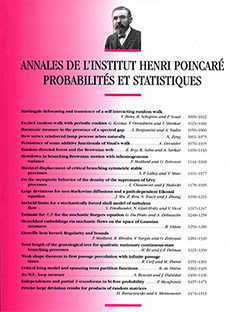Abstract
Consider a stochastic growth model on . Start with some active particle at the origin and sleeping particles elsewhere. The initial number of particles at is , where are independent random variables distributed according to μ. Active particles perform a simple continuous-time random walk while sleeping particles stay put until the first arrival of an active particle to their location. Upon the arrival all sleeping particles at the site activate at once and start moving according to their own simple random walks. The aim of this paper is to give conditions on μ under which the spread of the process is linear or faster than linear. The proofs rely on comparison to various percolation models.
Considérons un modèle de croissance stochastique sur . Dans la configuration initiale, il y a une particule active à l’origine et des particules dormantes sur les autres sites. Le nombre initial de particules en est , où sont des variables aléatoires indépendantes distribuées selon μ. Les particules actives effectuent une marche aléatoire simple en temps continu tandis que les particules dormantes restent en place jusqu’à la première arrivée d’une particule active à leur emplacement. À l’arrivée, toutes les particules dormantes sur le site s’activent en même temps et commencent à se déplacer selon leurs propres marches aléatoires simples. Le but de cet article est de donner des conditions sur μ sous lesquelles la propagation du processus est linéaire ou plus rapide que linéaire. Les démonstrations reposent sur la comparaison avec divers modèles de percolation.
Acknowledgements
We would like to thank Christian Remling for the construction used in the proof of Lemma 7.1 and Martin Zerner for bringing to our attention the works [47] and [41] and thus helping to place Section 3 in the context of existing research. We would also like to thank the anonymous referee whose comments helped to improve the paper.
Citation
Viktor Bezborodov. Tyll Krueger. "Linear and superlinear spread for stochastic combustion growth process." Ann. Inst. H. Poincaré Probab. Statist. 60 (3) 1619 - 1644, August 2024. https://doi.org/10.1214/23-AIHP1395
Information





